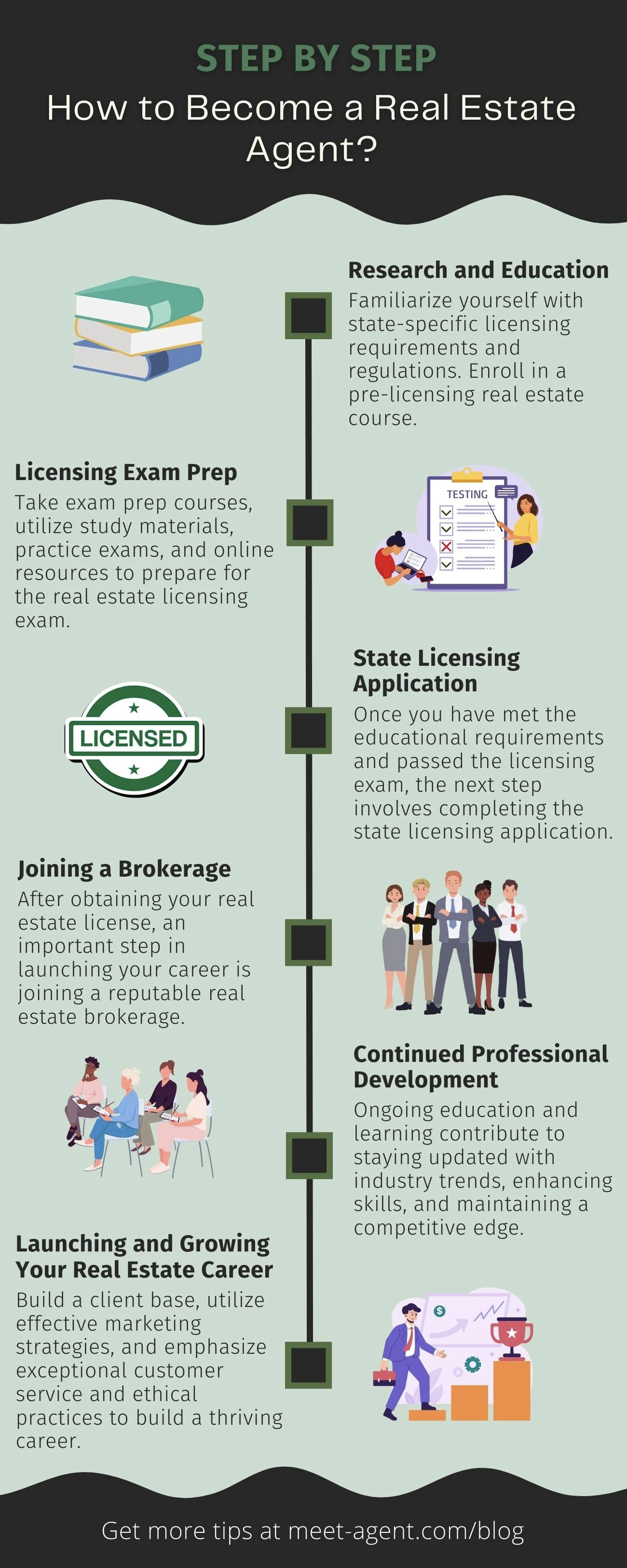How to Become a Real Estate Agent?
Becoming a real estate agent offers a pathway to a rewarding and potentially lucrative career. However, it is crucial to understand the process and requirements involved in entering this dynamic industry. According to recent data, the real estate sector continues to thrive, with significant growth and ample opportunities for aspiring agents. Understanding the importance of the process to become a real estate agent and having a glimpse into the potential rewards can inspire individuals to embark on this exciting career journey.
The real estate industry plays a vital role in the economy, representing a substantial portion of the GDP. In 2020 alone, the U.S. real estate industry contributed over $2.8 trillion to the country's economy, showcasing its significance and resilience. Aspiring agents must recognize the importance of undertaking the necessary steps to become licensed professionals within this thriving sector. By acquiring the required knowledge, skills, and qualifications, individuals can position themselves to capitalize on the abundant career opportunities available in real estate. Whether it's helping clients find their dream homes, closing lucrative deals, or building a successful brokerage, a career in real estate can be both personally fulfilling and financially rewarding.

Research and Education
To embark on a successful career as a real estate agent, thorough research and education are essential. State-specific licensing requirements and regulations vary, making it crucial to familiarize yourself with the specific guidelines for your desired location. Recent data shows that in the United States, every state has its own real estate commission or board responsible for overseeing licensing and regulatory matters.
List of real estate commission or board for each state as of July 2023
- Alabama - Alabama Real Estate Commission
- Alaska - Alaska Real Estate Commission
- Arizona - Arizona Department of Real Estate
- Arkansas - Arkansas Real Estate Commission
- California - California Real Estate Commission
- Colorado - Colorado Division of Real Estate
- Connecticut - Connecticut Real Estate Commission
- Delaware - Delaware Real Estate Commission
- District Of Columbia - DC Real Estate Commission
- Florida - Florida Real Estate Commission
- Georgia - Georgia Real Estate Commission & Appraisers Board
- Hawaii - Department of Commerce and Consumer Affairs Real Estate Branch
- Idaho - Idaho Real Estate Commission
- Illinois - Illinois Division of Real Estate
- Indiana - Indiana Real Estate Commission
- Iowa - Iowa Real Estate Commission
- Kansas - Kansas Real Estate Commission
- Kentucky - Kentucky Real Estate Commission
- Louisiana - Louisiana Real Estate Commission
- Maine - Maine Real Estate Commission
- Maryland - Maryland Real Estate Commission
- Massachusetts - Massachusetts Board of Registration of Real Estate Brokers and Salespersons
- Michigan - Michigan State Board of Real-Estate Brokers & Salespersons
- Minnesota - Minnesota Department of Commerce Real Estate Licensing
- Mississippi - Mississippi Real Estate Commission
- Missouri - Missouri Real Estate Commission
- Montana - Montana Board of Realty Regulation
- Nebraska - Nebraska Real Estate Commission
- Nevada - Nevada Real Estate Division
- New Hampshire - New Hampshire Real Estate Commission
- New Jersey - New Jersey Real Estate Commission
- New Mexico - New Mexico Real Estate Commission
- New York - Department of New York State
- North Carolina - North Carolina Real Estate Commission
- North Dakota - North Dakota Real Estate Commission
- Ohio - Ohio Real Estate Commission
- Oklahoma - Oklahoma Real Estate Commission
- Oregon - Oregon Real Estate Agency
- Pennsylvania - Pennsylvania Real Estate Commission
- Rhode Island - Rhode Island Department of Business Regulation
- South Carolina - South Carolina Real Estate Commission
- South Dakota - South Dakota Real Estate Commission
- Tennessee - Tennessee Real Estate Commission
- Texas - Texas Real Estate Commission
- Utah - Utah Division of Real Estate
- Vermont - Vermont Secretary of State
- Virginia - Virginia Real Estate Board
- Washington - Washington Real Estate Commission
- West Virginia - West Virginia Real Estate Commission
- Wisconsin - Department of Safety and Professional Services Real Estate Broker
- Wyoming - Wyoming Real Estate Commission
Enrolling in a pre-licensing real estate course approved by your state is a fundamental step towards obtaining your license. These courses provide comprehensive education on real estate principles, practices, and laws. According to industry statistics, completing a pre-licensing course has been shown to increase success rates in the licensing exam, ensuring aspiring agents are well-prepared for their real estate career journey. By dedicating time and effort to studying relevant topics and staying updated on industry trends, you can establish a strong foundation of knowledge that will serve you throughout your real estate career.
Enrolling in a pre-licensing real estate course approved by your state is a fundamental step towards obtaining your license.
Licensing Exam Preparation
Preparing for the real estate licensing exam is a critical phase in becoming a licensed agent. It requires a solid understanding of the exam format and content. Statistics reveal that the real estate licensing exam has varying passing rates across different states, underscoring the importance of effective preparation.
To increase your chances of success, it is essential to utilize study materials, practice exams, and online resources specifically designed for exam preparation. Research indicates that candidates who engage in practice exams have a higher likelihood of passing the licensing exam on their first attempt. These resources allow aspiring agents to familiarize themselves with the exam structure, gain confidence in answering questions, and identify areas that require further study.
Depending on individual needs, considering exam prep courses or tutoring can provide additional support. Studies show that candidates who take exam prep courses tend to have higher pass rates compared to those who rely solely on self-study. These courses offer structured guidance, expert insights, and targeted study materials to help aspiring agents fully grasp the concepts and knowledge required for success in the licensing exam. By investing time and effort in thorough exam preparation, you can position yourself for a confident and successful licensing exam experience.
State Licensing Application
Once you have met the educational requirements and successfully passed the licensing exam, the next step towards becoming a licensed real estate agent involves completing the state licensing application. Recent data indicates that the application process varies by state, underscoring the importance of understanding and following the specific requirements for your jurisdiction.
Completing the necessary paperwork and application for a real estate license is a crucial aspect of the licensing process. This typically involves providing personal information, educational background, and employment history. Research shows that ensuring accuracy and completeness in your application can help expedite the licensing process and minimize delays.
In addition to the application, gathering required documents is vital. These may include identification documents, such as a driver's license or passport, as well as educational transcripts or proof of completion of pre-licensing courses. It is essential to review the specific document requirements for your state to ensure compliance.
Paying applicable fees and submitting the completed application to the appropriate state agency is the final step in the licensing application process. Statistics reveal that the fees associated with the application vary across states, emphasizing the need to budget accordingly. Prompt submission of the application and payment of fees helps facilitate the processing of your license, allowing you to begin your real estate career in a timely manner.
Joining a Brokerage
After obtaining your real estate license, an important step in launching your career is joining a reputable real estate brokerage. Research indicates that the choice of brokerage can significantly impact an agent's success and professional growth. Therefore, conducting thorough research and selecting the right brokerage is essential.
After obtaining your real estate license, an important step in launching your career is joining a reputable real estate brokerage.
Begin by researching and identifying reputable brokerages in your area. Look for brokerages with a strong track record, positive reputation, and a supportive culture that aligns with your professional goals. Data suggests that agents who join established and reputable brokerages tend to benefit from enhanced resources, training opportunities, and a network of experienced professionals.

To make an informed decision, interview with multiple brokerages to assess factors such as culture, support systems, commission structures, and available resources. Industry statistics highlight that agents who carefully evaluate these aspects tend to have higher satisfaction and productivity levels.
Once you have chosen a brokerage, it is important to complete any additional onboarding requirements or training programs they may offer. This can include attending orientation sessions, familiarizing yourself with the brokerage's technology platforms, and participating in professional development programs. Engaging in these onboarding activities sets the stage for a successful and productive collaboration with your brokerage, enabling you to leverage their resources and expertise as you grow in your real estate career.
Continued Professional Development
Continued professional development is a crucial aspect of a successful and thriving real estate career. Ongoing education and learning contribute to staying updated with industry trends, enhancing skills, and maintaining a competitive edge. Research underscores the significance of lifelong learning in the real estate profession.
Understanding the importance of ongoing education and professional development is key to adapting to a dynamic industry landscape. Data indicates that real estate agents who actively pursue additional training and education tend to achieve higher levels of productivity and success. By continuously expanding your knowledge base, you can provide clients with valuable insights, navigate market changes more effectively, and offer exceptional service.
Exploring additional certifications, designations, or specialization courses is an excellent way to deepen your expertise and stand out in the real estate field. Studies show that agents who hold specialized certifications often earn higher incomes and attract more clients. Pursuing designations in areas such as luxury real estate, commercial property, or property management can open up new opportunities and expand your client base.
Attending industry conferences, workshops, and networking events is another vital component of professional development. These events offer valuable opportunities to learn from industry leaders, exchange ideas with peers, and build a strong professional network. According to industry data, agents who actively engage in networking and attend industry events tend to have broader referral networks, increased lead generation, and improved business growth.
By embracing continued professional development, you can stay ahead of industry changes, deepen your expertise, and position yourself as a knowledgeable and trusted real estate professional. Committing to ongoing learning and seizing opportunities for growth will contribute to long-term success in the dynamic real estate industry.

Launching and Growing Your Real Estate Career
Launching and growing your real estate career involves key strategies to establish yourself in the industry and achieve long-term success. Building a client base and establishing relationships with potential buyers and sellers is a fundamental aspect. Research indicates that successful agents often prioritize relationship-building and referrals as a significant source of business. (How to Get Real Estate Leads?)
Utilizing effective marketing strategies is essential to promote your services and listings. According to industry data, agents who embrace digital marketing and online platforms tend to attract a larger audience and generate more leads. Leveraging social media, creating a professional website, and utilizing online advertising can help increase visibility and reach a broader client base. (Tips for New Real Estate Agents: Building Your Brand from Scratch)
Emphasizing exceptional customer service and ethical practices is crucial for building a strong reputation and fostering client loyalty. Studies show that satisfied clients are more likely to refer agents to their networks. By delivering excellent service, being responsive, and maintaining high ethical standards, you can establish trust and build a solid foundation for a thriving real estate career.
Conclusion
Becoming a real estate agent requires dedication, commitment, and a willingness to continuously learn and adapt. Throughout this article, we have explored the essential steps to embark on a successful career in real estate. From understanding the process and education requirements to joining a reputable brokerage and embracing ongoing professional development, each stage plays a crucial role in shaping your journey.
In summary, becoming a real estate agent involves researching and understanding state-specific licensing requirements, completing educational courses, preparing for and passing the licensing exam, submitting the state licensing application, joining a brokerage, and prioritizing continued professional development. While the path may vary for each individual, the overarching message remains the same: with dedication and a thirst for knowledge, a fulfilling and rewarding career in real estate awaits.
By embracing the steps outlined in this article, you can position yourself for success in this dynamic industry. Remember to stay informed, remain adaptable, and consistently seek opportunities for growth. With dedication, perseverance, and a commitment to continuous learning, you can confidently embark on your real estate journey and forge a thriving career that not only brings professional fulfillment but also allows you to positively impact the lives of buyers, sellers, and the communities you serve.
Looking for leads?
Free real estate leads for agents. Join Meet Agent today to follow up!




